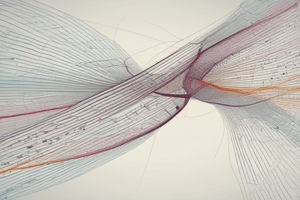Podcast
Questions and Answers
What is the general form of a linear differential equation?
What is the general form of a linear differential equation?
- dy/dx = P(x) + Q(x)y
- dy/dx + P(x)y = Q(x) (correct)
- dy/dx - P(x)y = Q(x)
- dy/dx = P(x)y + Q(x)
What is a property of linear differential equations?
What is a property of linear differential equations?
- Superposition principle and exactness
- Superposition principle
- Linear homogeneity (correct)
- Linear homogeneity and separability
What type of first-order differential equation can be solved by separating variables?
What type of first-order differential equation can be solved by separating variables?
- Exact differential equations
- Linear differential equations
- Homogeneous differential equations
- Separable variables differential equations (correct)
What is the general form of a first-order differential equation?
What is the general form of a first-order differential equation?
What is a method of solving first-order differential equations?
What is a method of solving first-order differential equations?
What is the solution method for an exact differential equation?
What is the solution method for an exact differential equation?
What is the form of the linear homogeneity property?
What is the form of the linear homogeneity property?
Study Notes
Differential Equations
Linear Equations
- A linear differential equation is a differential equation in which the derivative of the unknown function is proportional to the function itself.
- General form:
dy/dx + P(x)y = Q(x) P(x)andQ(x)are functions ofx- Properties:
- Linear homogeneity: If
y1andy2are solutions, thenc1y1 + c2y2is also a solution for any constantsc1andc2. - Superposition principle: The general solution is the sum of the homogeneous solution and the particular solution.
- Linear homogeneity: If
First Order Equations
- A first-order differential equation is a differential equation that involves only the first derivative of the unknown function.
- General form:
dy/dx = f(x, y) - Types:
- Separable variables:
dy/dx = f(x)g(y), can be solved by separating variables and integrating. - Linear:
dy/dx + P(x)y = Q(x), can be solved using an integrating factor. - Exact:
M(x, y)dx + N(x, y)dy = 0, can be solved by finding an implicit solution.
- Separable variables:
- Solution methods:
- Direct integration:
y = ∫f(x)dx + C - Separation of variables:
∫dy/g(y) = ∫f(x)dx + C
- Direct integration:
Differential Equations
Linear Equations
- General form of linear differential equation:
dy/dx + P(x)y = Q(x) P(x)andQ(x)are functions ofx- Properties of linear differential equations:
- Linear homogeneity: If
y1andy2are solutions, thenc1y1 + c2y2is also a solution for any constantsc1andc2 - Superposition principle: The general solution is the sum of the homogeneous solution and the particular solution
- Linear homogeneity: If
First Order Equations
- General form of first-order differential equation:
dy/dx = f(x, y) - Types of first-order differential equations:
- Separable variables:
dy/dx = f(x)g(y), can be solved by separating variables and integrating - Linear:
dy/dx + P(x)y = Q(x), can be solved using an integrating factor - Exact:
M(x, y)dx + N(x, y)dy = 0, can be solved by finding an implicit solution
- Separable variables:
- Solution methods:
- Direct integration:
y = ∫f(x)dx + C - Separation of variables:
∫dy/g(y) = ∫f(x)dx + C
- Direct integration:
Studying That Suits You
Use AI to generate personalized quizzes and flashcards to suit your learning preferences.
Description
Learn about linear differential equations, their general form, and properties such as linear homogeneity and superposition principle.





